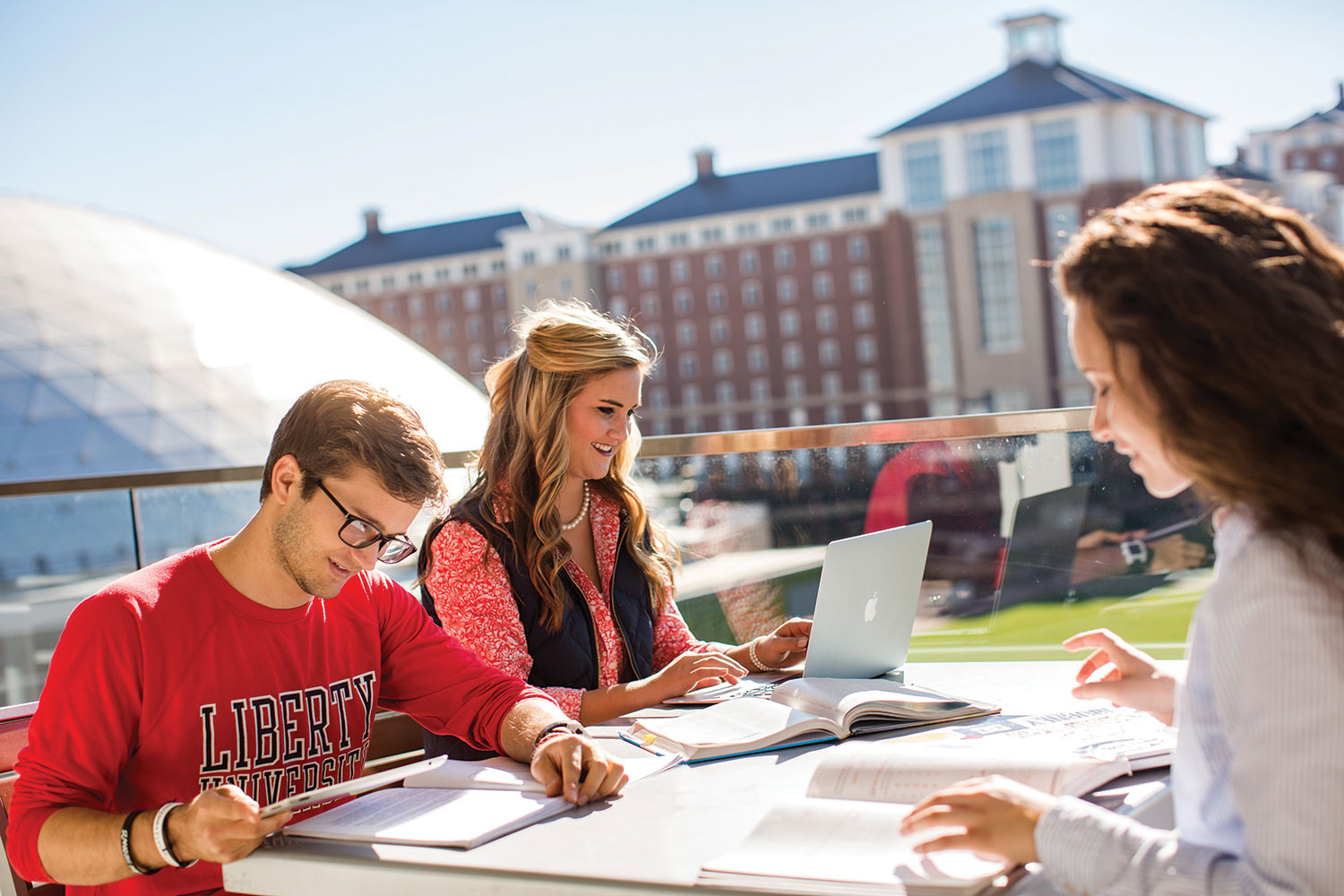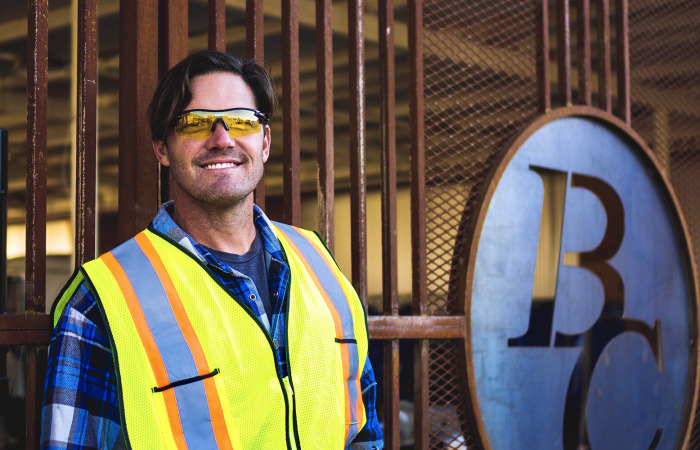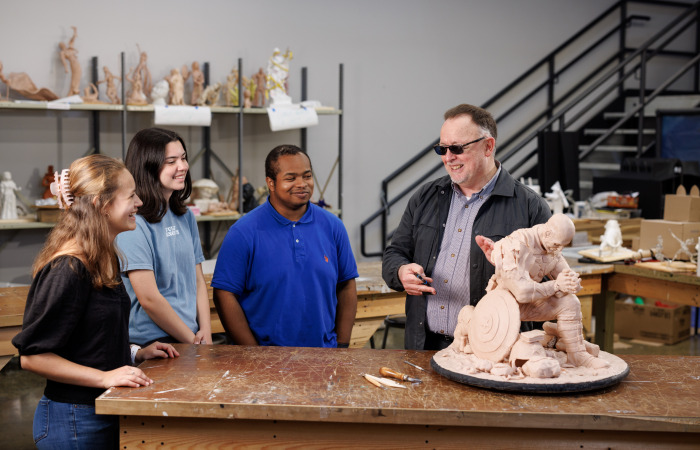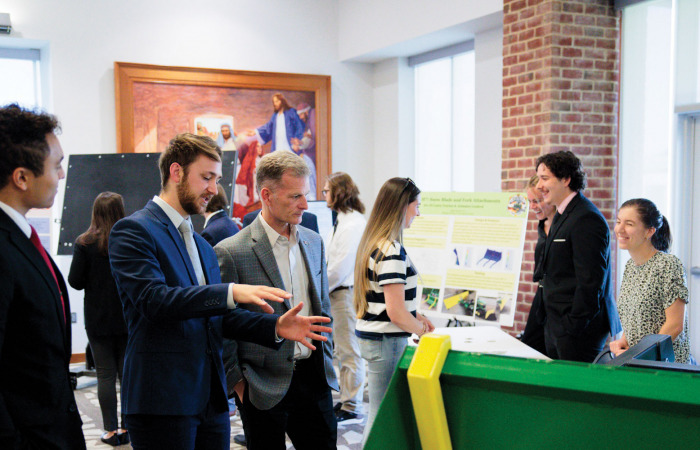Now designated as a Doctoral University, Liberty enters a new era of academic excellence
Liberty University’s astonishing growth over its relatively short life span may be old news to those connected to the campus, but to the higher education community, it represents nothing less than a new paradigm for the future of higher education. And Liberty is making advancements in a way that is earning the respect of more traditional peers. Once a small Bible college and now the largest private, nonprofit four-year college in the country, the nation’s fifth largest university, and the largest college in Virginia, Liberty takes its place among the only 7 percent of colleges and universities in the nation to achieve a Carnegie classification of “Doctoral University” with a research designation. This 7 percent of schools packs a powerful educational punch, educating 33 percent of the students enrolled in institutions of higher education and shaping the future of industries worldwide.
This new designation, announced in early 2016, positions Liberty with institutions such as Boise State, Hofstra, Kennesaw State, Seton Hall, Valdosta State, and Villanova, recognizing the size and span of the institution’s doctoral programs and the strength of its emerging research culture.
Christopher Seitz, assistant professor of public and community health and a newly minted Fulbright Scholar, sees the new Carnegie classification as coming at exactly the right time to propel the university forward into a new era: “I think there’s a perfect storm brewing on campus that will push Liberty University to the forefront of the nation for training research-savvy students.”
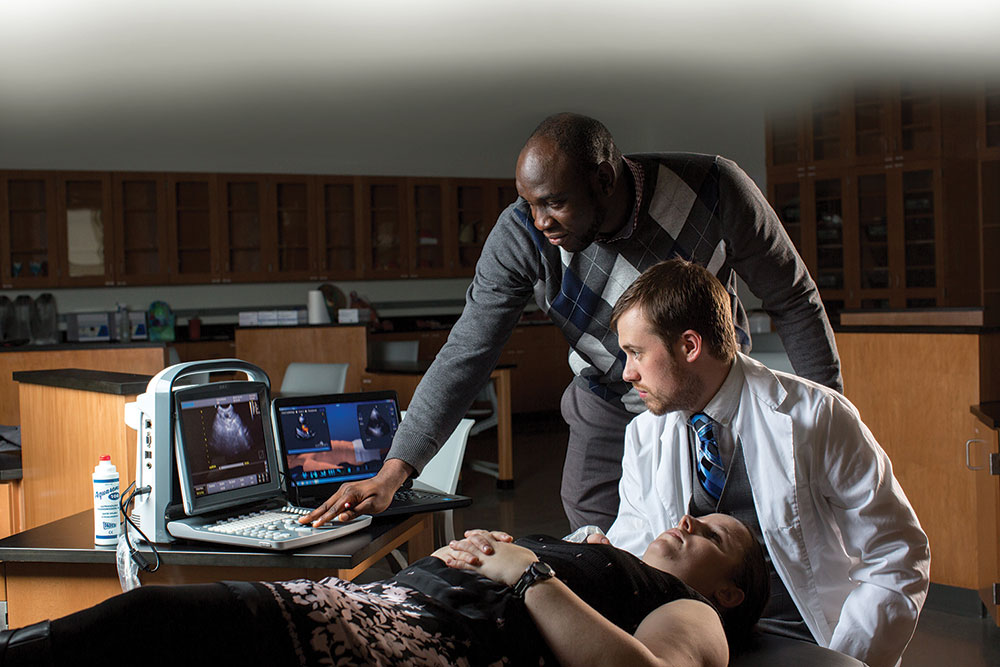
Dr. Ben Kalu, an assistant professor of biology, mentors graduate biomedical sciences student Joseph Gosnell on the use of ultrasound technology.
Liberty’s new designation as an R3: Doctoral Institution reflects the level of research activity on campus. This level is measured in a variety of ways, including the total dollars designated for research-related purposes, the number of faculty who conduct or supervise research, and the number of graduates in research-intensive fields. The Carnegie classification system has been used for more than 40 years by analysts, government officials, and academic groups as a way of understanding the differences between institutions of higher education. It is often used as a basis for rankings systems, U.S. Department of Education reports, financial aid, and grant expenditures. For example, Liberty’s new Carnegie classification will change its place in the U.S. News & World Report rankings from a “regional” to a “national” university with a “Doctoral/Research University” label. Liberty, in short, is now swimming in a much bigger pond.
Liberty attained this new classification in large part because of the size of its Doctor of Education degree program, which currently has more than 1,000 students enrolled. But having a significant number of graduates is only the first step; to advance within this new, more competitive set of rankings, Liberty will look to build on the strong foundation already laid in programs such as the Doctor of Education.
School of Education Dean Emeritus Karen Parker reports that the move to increase the size and influence of Liberty’s graduate programs in education created a need for significantly increased research activity.
“It was determined several years ago that if we were to develop what is now one of the largest education doctoral programs in the country, we would also have to develop a culture of research among our faculty and students,” Parker says. “That culture now exists, and some of our faculty have developed into true experts in their areas.”
Originally, Parker says faculty members were instructed on how to take major research projects (including dissertations and theses) and transform them into research presentations at conferences and articles for submission to professional journals. Their work had a direct application for students. The next — and more important step, she adds — was to build expectations for research into the faculty evaluation process.
Research at a teaching university
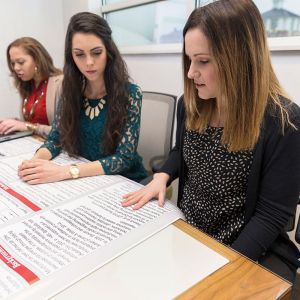
Recent graduate Brittané Dodwell (from left), rising senior Abigail Long, and Dr. Brianne Friberg, associate professor of psychology, discuss a psychology research project.
Typically, universities bill themselves as either “teaching” or “research” focused. Small, student-centered institutions of higher education generally hire faculty who focus mainly on instruction, rather than on research, scholarship, or professional activity in their field. By contrast, research universities often have large numbers of faculty members who teach few, if any, courses, and whose primary responsibility is to conduct grant-funded research, often in isolation from the student body.
Liberty has long billed itself — and rightly so — as a teaching-focused university. Students have consistently rated their interactions with faculty as among the most powerful aspects of their education; in a recent survey, over 97 percent of Liberty alumni touted the positive experiences they had with the professors in their programs. The new R3 designation does not indicate a change of focus away from classroom teaching, but rather a broader commitment to include more significant research experiences as part of what students do on their way to a degree.
At Liberty, research has long been understood as an integral part of teaching. Faculty conduct research to remain experts in their fields. Liberty’s faculty has won more than 75 research grants and has made more than 3,500 presentations at scholarly conferences since 2010, many of them on topics with direct application to what they teach in the classroom.
David Snead, professor of history and author of four books on 20th-century American diplomatic and military history, moved from his doctoral program at the University of Virginia to a faculty position at Texas Tech. He made the move to Liberty, though, because of the way that teaching and research were intertwined. According to Snead, “I pursued a position at Liberty because I wanted to experience what it would be like to teach at a Christian institution that emphasized teaching while still encouraging some research.”
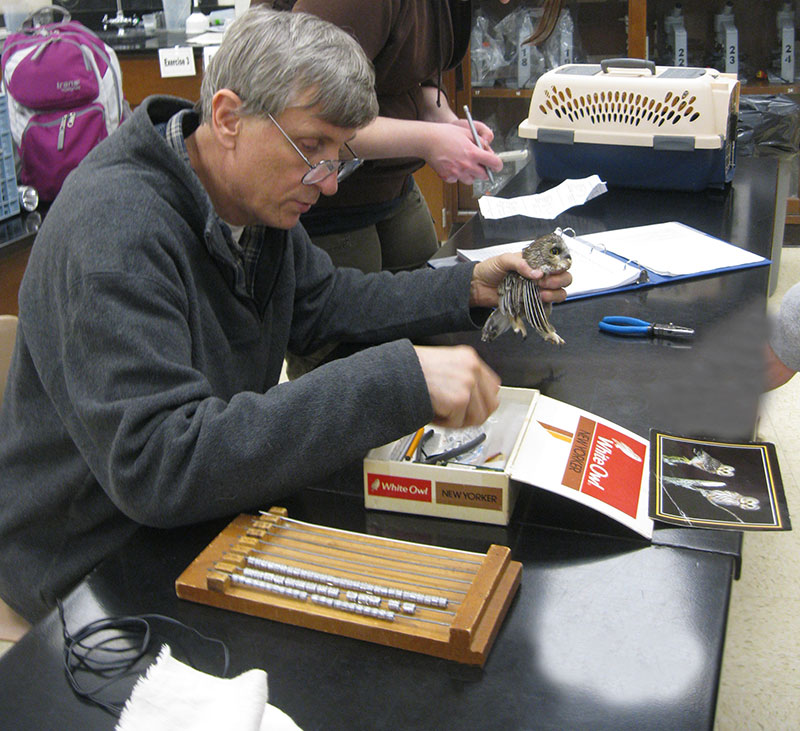
Gene Sattler, professor of biology, tags a northern saw-whet owl as part of research into the migration of the species in Central Virginia.
Gene Sattler, professor of biology and author of numerous articles, began his research on birds at the Smithsonian Institution, where he studied as part of his graduate program at the University of Maryland. Like Snead, Sattler was drawn to Liberty’s Christian worldview, and he quickly saw the opportunity to include students in his own research projects. His current project, which studies the migration dynamics of the northern saw-whet owl, involves students as integral parts of the team.
“This project has been instrumental in giving many of our biology majors research experience,” Sattler says. “It is very valuable for these students to learn such things as the logistical challenges of carrying out research beyond the comforts and controlled settings of the laboratory in a field setting, the difficulty of accumulating meaningful sample sizes when dealing with wild animals, and how to handle these creatures in a manner that is safe for both the student and the animal. A number of the students associated with the project have gone on to careers such as conservation officer and environmental impact assessor, or on to graduate school, studying animals in a field setting.”
Integrating research into the classroom experience helps the university to fulfill its mission — Training Champions for Christ — to a greater degree than ever before, as research enables students to enter the “real world” with a more relevant skill set.
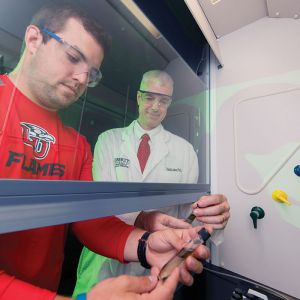
Dr. Todd Allen, associate professor of chemistry, works with recent graduate Grant McClure on research related to the conversion of algae to biofuels.
Todd Allen, associate professor of chemistry, came to Liberty after 15 years with the Department of Defense (DOD), where he served as the analytical laboratory manager, completing a variety of projects, including one related to the conversion of algae to biofuels. Liberty University had already expressed interest in assisting with this DOD project and acquired the gas chromatograph mass spectrometer (GC/MS) instrument needed to conduct this analytical work. Now, with Allen at the helm of this project, students use the GC/MS to determine the total content of oil present in algae samples received from the DOD, an essential step in determining their potential to be used as biofuels — a project that enables students to learn real-world, hands-on, marketable skills, while contributing to more efficient stewardship of God’s creation at the same time.
The Quality Enhancement Plan
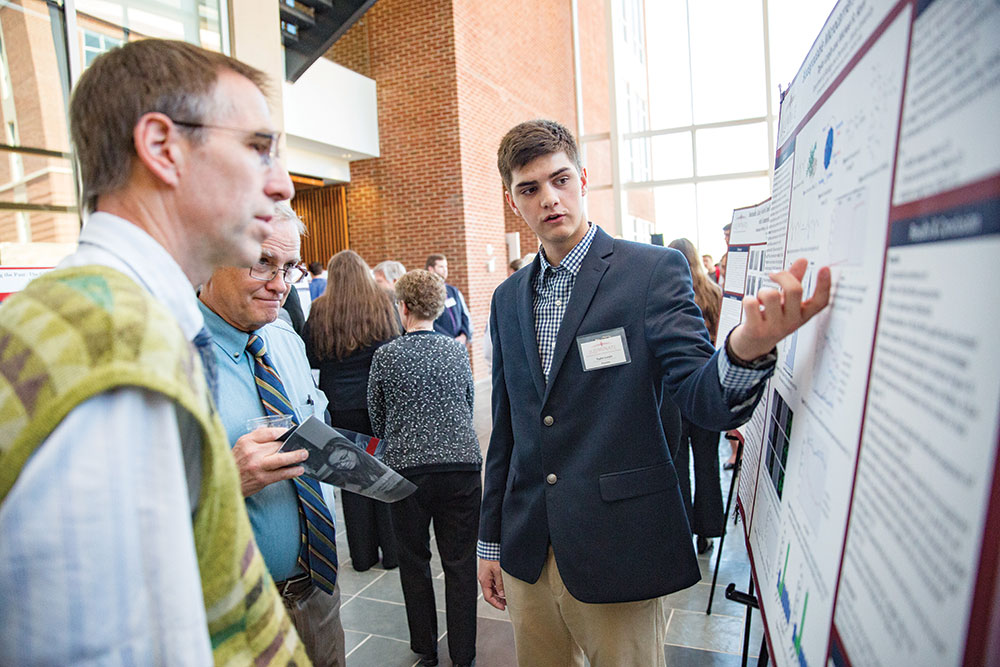
Undergraduate biomedical sciences student Taylor Lonjin presents his poster on Biodegradable Microcarriers for Drug Delivery during a Research Week symposium.
As part of its reaffirmation of accreditation every 10 years through the Southern Association of Colleges and Schools Commission on Colleges (SACSCOC), Liberty develops a Quality Enhancement Plan (QEP) to improve or expand student learning in a specific area. The recently launched QEP, “Illuminate: Cultivating a Community of Research,” focuses on taking undergraduate students through all the steps of research, from developing basic competencies to designing experiments and projects, to disseminating results in a public forum. The QEP is being carried out through the newly created Center for Applied Research & Scholarship, which brings together many of the research-related efforts already occurring on campus and creates opportunities for more, including smaller research-focused classes working on real-world research projects.
When President Jerry Falwell addressed a meeting of all residential and online faculty in April, he congratulated them on making commitments to research and developing this plan across all disciplines.
“There could not be a more appropriate topic for our QEP than research,” he said, “because at this stage in our history — we’re a young school, we’ve been mainly a teaching university for years — it’s time for us to take the next step, even at the undergraduate level, to get our students to develop a culture of research.”
Faculty members are already clamoring to be a part of this initiative — in large part because they know how much of an impact these teaching practices can have. Christopher Seitz shares his own experience as an undergraduate: “During my last semester, my academic advisor took me under her wing on a research project. It was my first experience conducting a research project from start to finish … and I loved it. I was thrilled to create new knowledge. Now that I’m a professor, I want my undergraduate students to have the same experience that I had when I was in their shoes.”
If students’ successes to this point are any indication, Liberty will be right at home among the ranks of newly minted research universities. Last May, Associate Professor of Biology Dr. Gary Isaacs and four of his students received the J. Shelton Horsley Award at the Virginia Academy of Science’s Annual Meeting at Virginia Commonwealth University — the highest honor conferred by the academy for original research. Isaacs and his students have been conducting Alzheimer’s disease research for several years. Emily Armstrong, a graduate of Liberty’s Department of Psychology, won the PSI CHI Undergraduate Research Award, one of two undergraduate awards presented at the 2015 Association for Psychological Science Convention last May in New York City, for her work on parenting behaviors. Two Liberty University alumni received awards from the Phi Alpha Theta national history honor society’s National Paper Competition in 2014, with one, Karissa Marken (’14) winning the grand prize. Abigail Lenz (’14), who is currently seeking her Master of Science in Biomedical Sciences, received Liberty’s first graduate student award at the Virginia Academy of Science’s Annual Meeting in 2015, the year Liberty started its graduate program in biology. Working with Dr. Andrew Fabich and Dr. Jeffery Tomkins, Lenz released the university’s first draft genome sequence, mapping the DNA of a common strain of E. coli bacteria in hopes of helping to find a cure for diseases caused by the strain.
The QEP seeks to organize and expand similar efforts across the campus — just the sort of activity that a national university with an emerging reputation for research and scholarship should undertake. Yet, ultimately, this new emphasis on research, like Liberty’s ever-expanding reach around the globe, contributes to far more than the advancement of the university itself. Rather, in giving students the ability to conduct real-world research that makes a difference in people’s lives, Liberty takes another step toward fulfilling the Great Commission.
— Emily Walker Heady is Vice Provost for Undergraduate Education, Dean of the College of General Studies, and a Professor of English.
Question>Investigate>Experience>Learn
Undergraduate and graduate students alike are able to participate in meaningful research opportunities across a broad range of disciplines. These are just four examples:
HISTORY
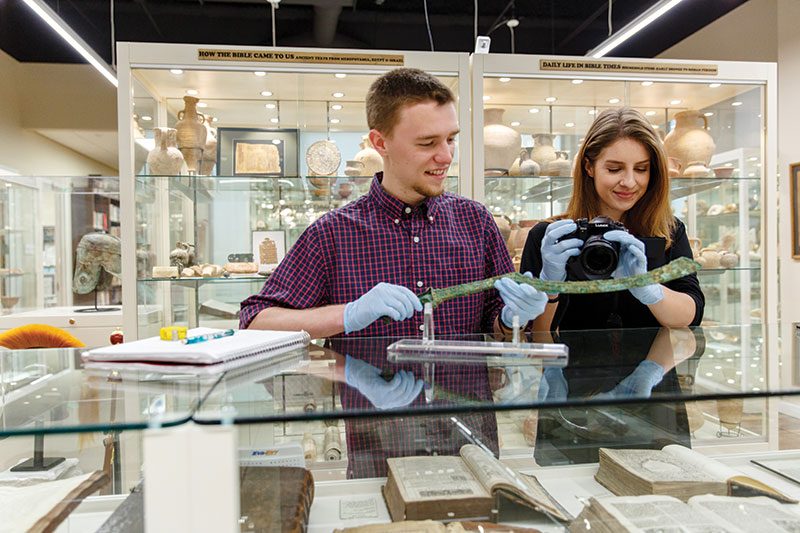 As part of a pilot course on digital history, two history majors — honors student Luke Dixon (a rising sophomore) and Mallory Walker (who recently graduated) — created an online exhibit for the Liberty Biblical Museum called “Weapons of the Bible” (lubiblicalmuseum.weebly.com). Donna Donald, assistant professor of history, and Craig Brigman, assistant professor of information technology, taught the course; Donald provided guidance on history and research and Brigman gave technological instruction.
As part of a pilot course on digital history, two history majors — honors student Luke Dixon (a rising sophomore) and Mallory Walker (who recently graduated) — created an online exhibit for the Liberty Biblical Museum called “Weapons of the Bible” (lubiblicalmuseum.weebly.com). Donna Donald, assistant professor of history, and Craig Brigman, assistant professor of information technology, taught the course; Donald provided guidance on history and research and Brigman gave technological instruction.
Collaboration was an important aspect of the class, and these particular students chose to work with the Biblical Museum. Graduate history student Christy Connell helped select pieces for the exhibit and provided additional background information. Dixon and Walker researched museum artifacts, took photographs, and then created the interactive, online exhibit.
Museums and historical sites are increasingly using technology to engage their audiences, and future digital history students will have opportunities to create additional online exhibits, giving them valuable experience using ever-changing electronic mediums.
PSYCHOLOGY
 Recent psychology graduates Joe Strasshofer, Danielle Novak, and Lauren Shier have been working under the direction of Dr. Tim Barclay, researching a new concept called “mental optometry.” This concept investigates the correlation between physical vision, body orientation, and mind’s eye perception in relation to emotions and behavior.
Recent psychology graduates Joe Strasshofer, Danielle Novak, and Lauren Shier have been working under the direction of Dr. Tim Barclay, researching a new concept called “mental optometry.” This concept investigates the correlation between physical vision, body orientation, and mind’s eye perception in relation to emotions and behavior.
Last semester, the students gathered data on subjects exhibiting various anxiety disorders — evaluating the sorts of images their eyes naturally gravitated toward as well as how their emotions and behaviors affected their ability to locate positive images within a set. This ongoing research has significant implications for those struggling with depression and mental illness, including military veterans with Post-Traumatic Stress Disorder. The students and Dr. Barclay published an article on their research in the Journal of Psychology.
BIOLOGY
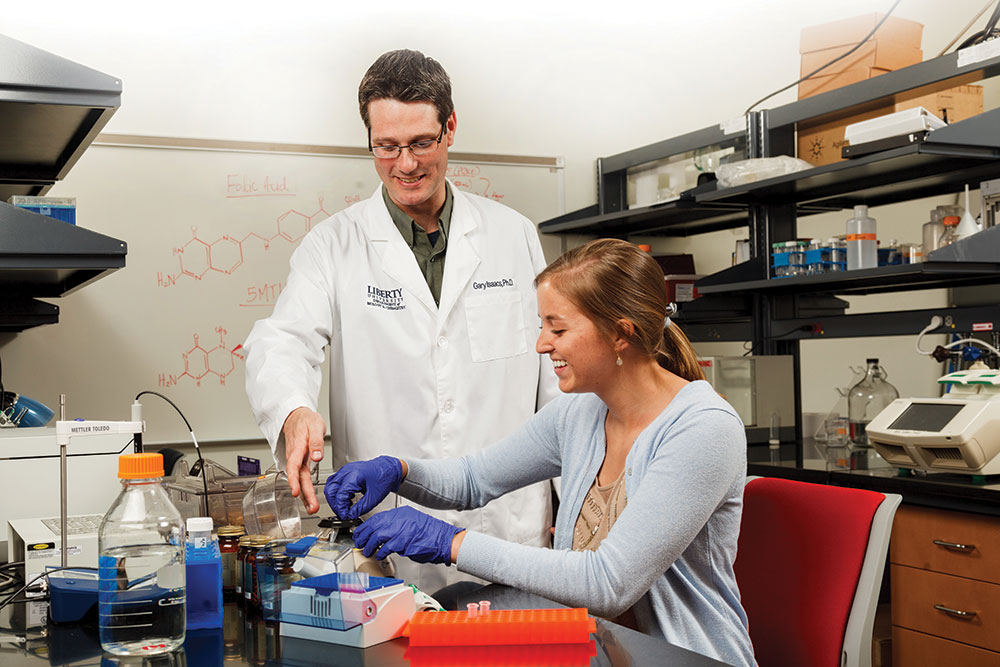 Under the supervision of Dr. Gary Isaacs, associate professor of biology, rising juniors Caleb Schreiner, Christopher Schreiner, and Caroline Roberts have been engaged in an ongoing nutritional study on mice. The project compares the difference between mice raised on diets with and without folic acid to explore its effects on long-term health. The students are investigating the cellular response, including gene activity and DNA modifications, to natural folate sources at various developmental stages. In addition to learning to care for the animals, students are learning to collect tissue samples, perform behavioral and molecular tests, and analyze data.
Under the supervision of Dr. Gary Isaacs, associate professor of biology, rising juniors Caleb Schreiner, Christopher Schreiner, and Caroline Roberts have been engaged in an ongoing nutritional study on mice. The project compares the difference between mice raised on diets with and without folic acid to explore its effects on long-term health. The students are investigating the cellular response, including gene activity and DNA modifications, to natural folate sources at various developmental stages. In addition to learning to care for the animals, students are learning to collect tissue samples, perform behavioral and molecular tests, and analyze data.
This study may provide valuable insight into disease progression in humans. It is well known that folate metabolism is important to human health, and an altered folate cycle can affect chemical markers in DNA. Modifications to DNA are associated with birth defects and a number of diseases, including Alzheimer’s disease and cancer.
ENGINEERING
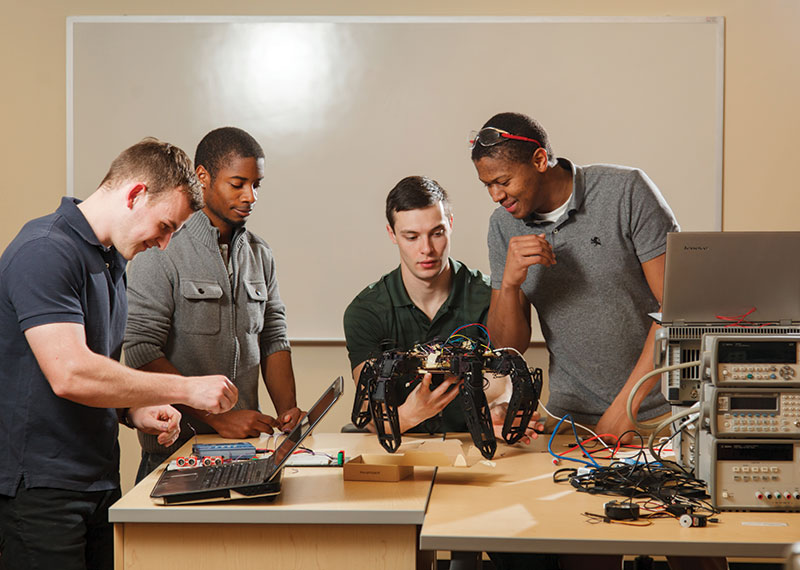 A team of both electrical and computer engineering students worked to transform a hexapod (six-legged robot) into an autonomous cyber-developmental platform. The team (comprised of recent graduates Dustin Bowe, Andrew Davis, and Josiah Nagel and supervised by Dr. Carl Pettiford and Professor Michael Miauzzo) applied sensors to the machine that use an algorithm to help the robot detect its surroundings and avoid obstacles, enabling it to move freely on its own. This process uses an embedded system and Wi-Fi to connect to the cloud, allowing the robot to be controlled from anywhere in the world.
A team of both electrical and computer engineering students worked to transform a hexapod (six-legged robot) into an autonomous cyber-developmental platform. The team (comprised of recent graduates Dustin Bowe, Andrew Davis, and Josiah Nagel and supervised by Dr. Carl Pettiford and Professor Michael Miauzzo) applied sensors to the machine that use an algorithm to help the robot detect its surroundings and avoid obstacles, enabling it to move freely on its own. This process uses an embedded system and Wi-Fi to connect to the cloud, allowing the robot to be controlled from anywhere in the world.
Future students will learn from this project, adding innovations from various disciplines and improving their ability to work on complex systems.
